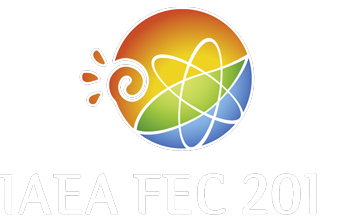Speaker
Dr
Aihui Zhao
(Tsinghua University, China)
Description
The lower hybrid current drive (LHCD) is one of the most effective tools for driving current in present tokamak plasmas. However, for reactor-graded density plasmas, the efficiency of LHCD degrades dramatically. The dependence of LHCD efficiency on isotopic plasma content (hydrogen/deuterium) was studied in experiments. Although according to the linear dispersion theory, the deuterium plasma could increase the linear LH resonance density, but the observed density limit for LHCD generation in deuterium plasma experiments did not increase obviously as expected. Further experiments showed that parametric instabilities (PI) may play an important role in LHCD switch-off. So in this work, we will try to give a theoretical study of isotopic effect of parametric instabilities during lower hybrid waves injection into hydrogen/deuterium plasmas.
Based on the local dispersion relation of the PI, the numerical results are compared in hydrogen and deuterium plasmas under typical SOL parameters. The calculation results show that for isotopic plasmas the unstable regions of growth rates are close. The maximum growth rates corresponding to the ion sound quasimode (ISQM) have a little difference, while the second maximum growth rates corresponding to the ion cyclotron quasimode (ICQM) are nearly the same. These numerical results can be understood by the analytical approximation from the fluid model. For different parameters, such as density, temperature and magnetic field, the growth rates of the ICQM are calculated for isotopic plasmas. It shows that the ICQM growth rates increase with the increasing densities and the decreasing temperatures and magnetic fields for both hydrogen and deuterium plasmas.
| Country or International Organization | China |
|---|---|
| Paper Number | TH/P4-36 |
Primary author
Dr
Aihui Zhao
(Tsinghua University, China)
Co-author
Prof.
Zhe Gao
(Tsinghua University)

